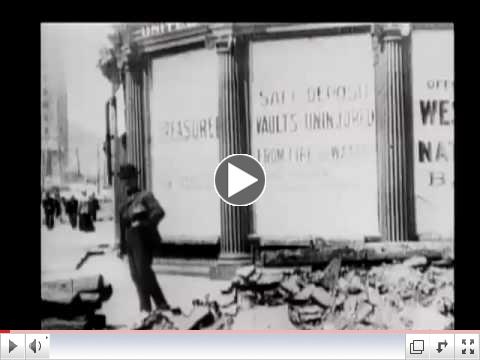Earthquakes and One-dimensional Planning
Thinking beyond single events |
Shortly after 5 AM on the morning of April 18, 1906 San Francisco was struck by a major earthquake estimated to have been between magnitude 7.7 and 8.3. The series of shocks lasted between 45-60 seconds and produced considerable structural damage.
Small fires broke out immediately after the event but since the temblor had destroyed the central fire dispatch station ruptured water mains, there was little that firefighters could do. The many small blazes coalesced into a series of larger fires that would burn for three days and destroy much of the city.
The San Francisco earthquake is an extreme example of a cascading event. This is where an initial triggering event serves as the catalyst for a series of often unforeseen events. In this case, an earthquake on the San Andreas Fault created the conditions for a second catastrophe - the series of firestorms that followed. | |
CLICK HERE TO READ THIS ARTICLE |
|
April 18, 1906
 | | San Francisco earthquake and fire, April 18, 1906 |
|
Quick Links
 | | My Website |
My Blog
 | | Newsletter Archive |
|
|
Greetings!
Welcome to the April issue of Emergency Management Solutions. April 18, 1906 is a date of special significance to San Franciscans. It's the anniversary of the earthquake and fires that destroyed much of the City. It's the reason that the symbol of the City is the Phoenix rising from the ashes. It is a reminder that while disasters can destroy what we build, they cannot destroy the human spirit. It's with this in mind that my white paper this month considers some of the lessons that we have not yet learned from 1906 and subsequent disasters, most recently the earthquake in Japan. This month's video links to footage from Library of Congress shot shortly after the earthquake that gives you a sense of the devastation from the San Francisco earthquake. If you are having trouble viewing the white paper, try clicking on the link at the top of the page. Alternatively, you can always find my white paper on my blog site, Canton on Emergency Management. |
|
Regards,
 |
Professional Development
When do you stop learning? It seems a silly question, but I'm constantly amazed when I talk to colleagues who have never read a book on our profession, attended a seminar, or taken an online course. A professional understands that we should be perpetual students.
There are two very good reasons for this. The first is that we stagnate if we do not continue to be challenged. Our personal growth hinges on our ability to assimilate new information and apply it to our daily lives. The ability to learn from the experiences of others is one of the gifts that we've been given as human beings. Secondly, our profession is constantly evolving. We either keep up with those changes or we get left behind. I'm not talking about just the latest guidance document or legal requirement. I'm talking about those things that fundamentally change how we operate. For example, social media is rewriting the book on crisis communications - we're seeing evidence of that in the recent earthquake in Japan. So in addition to all those other things you're thinking about, think about a plan for your continuing education. Whether it's reading a book, participating in an online forum or newsgroup, or attending a seminar, you need to include this in your annual work plan. It's just part of being a professional. |
|
Life Balance for Emergency Managers
How do you know if you're doing the right thing? No matter how self-contained you are, you will at some point feel the need for affirmation that you are on the right track. However, we are often isolated as emergency managers. We're usually the only one in our circle of friends that do what we do and it's hard to explain it to people sometimes.
Our natural inclination is to turn to our colleagues, either directly or through some type of virtual contact. But colleagues often see things the same way we do and their ideas, no matter how well-intentioned, may not offer be sufficiently different to offer insight.
What I'm saying is that if you need a diverse group of friends. It's too easy in this business to spend time exclusively with colleagues. Give some thought to those friends who stimulate you intellectually, who make you question and rethink your positions, and who offer opposing viewpoints. It's a simple way to keep in touch with real life. |
|
From the Bookshelf
One of the best books I have read on the San Francisco earthquake and fires is Dennis Smith's San Francisco is Burning: The Untold Story of the 1906 Earthquake and Fires. Most books about the 1906 earthquake have a sameness about them, reiterating the same stories and using the same sources. Smith brings a fresh and welcome perspective by detailing the firefighting operations, particularly the role of the US Navy. A retired firefighter himself, Smith gives an immediacy to the story lacking in many dry history books and captures the heroism of people who, when faced with disaster, chose to stand rather than run. Well worth the read! |
Speaking Engagements
June 20: Social Media and Disaster Preparedness Redwood City/San Mateo County Chamber of Commerce, Santa Clara CA |
|
Looking for a Speaker?
Need a speaker for your next conference? I offer keynotes, seminars and workshops. You can find more details on my website or on my new SpeakerWiki page.
 | | Lucien Canton Seminar Excerpts |
|
|
|
If you've heard me speak...
...I'd greatly appreciate it if you would take a minute to give me feedback on my SpeakerWiki site. Just go to the site and click on the "Write A Review" button. Many thanks! |
|
|